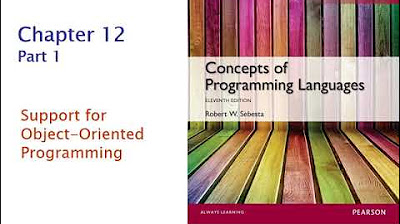COS 333: Chapter 2, Part 3
Summary
TLDRThis lecture delves into the evolution of major high-level programming languages, highlighting their unique contributions and influences. It covers a spectrum of languages from Simula 67's data abstraction to modern scripting languages like JavaScript and Ruby. The discussion includes object-oriented languages like Smalltalk and C++, emphasizing their impact on software development. The lecture also touches on scripting languages' role in web development and the emergence of hybrid languages like XSLT and JSP, showcasing the continuous innovation in programming paradigms.
Takeaways
- 📚 The lecture series covers the evolution of major high-level programming languages, providing an overview of their development and influence on modern programming paradigms.
- 🔍 SIMULA 67 introduced data abstraction concepts and co-routines, which are foundational to object-oriented programming and system simulations.
- 📈 ALGOL 68 emphasized orthogonal design, allowing for flexible and complex data structures, and influenced later languages like Pascal and C.
- 🎓 Pascal was widely used in education for teaching structured programming, while C became prominent for systems programming, especially in UNIX and Linux.
- 🤖 Prolog, a logic programming language, is based on formal logic and is used for artificial intelligence applications like natural language processing.
- 🛡️ Ada was developed with extensive military ties, focusing on reliability and safety, and introduced features like packages, exception handling, and tasking.
- 🚀 Smalltalk was the first fully object-oriented programming language, influencing the design of modern OOP languages and introducing graphical user interfaces.
- 🔗 C++ added object-oriented programming to the C language, becoming a powerful and flexible language, albeit with a complexity that can lead to errors.
- 🌐 Java was designed for embedded systems but evolved into a general-purpose language, emphasizing portability and reliability over raw power.
- 📝 Scripting languages like Perl, PHP, JavaScript, Python, Ruby, and Lua are primarily used for web development and automation, offering flexibility and ease of use.
- 🛠️ C# was developed by Microsoft as part of the .NET framework, incorporating features from C++, Java, and Delphi, and promoting a balance between safety and power.
Q & A
What was the first programming language to introduce data abstraction concepts?
-Simula 67 was the first programming language to introduce data abstraction concepts, which later evolved into full object-oriented programming in the 1980s.
How does Algol 68 differ from Algol 60 in terms of its design objectives?
-Algol 60 aimed to be a machine-independent programming language, while Algol 68 was designed to be a general-purpose programming language with an orthogonal design, focusing on flexibility and simplicity rather than machine independence.
What are the two main contributions of Simula 67 to programming language development?
-Simula 67 introduced coroutines, which are special sub-programs that can be suspended and resumed, and the earliest concepts of data abstraction, including classes and objects, although not a fully featured object-oriented system.
Why was Pascal widely used in education for teaching structured programming?
-Pascal was a small, simple programming language that didn't bring much new to the table but was widely used for teaching structured programming, particularly at the school level, due to its straightforwardness and clarity.
What is the significance of the Prolog programming language in the context of programming paradigms?
-Prolog is significant because it is based on formal logic, making it very different from imperative and functional programming languages. It introduced non-procedural programming, composed of facts, rules, and queries for inferencing engines to process.
Why was Ada developed, and what was its initial intended application?
-Ada was developed to address the United States Department of Defense's need for a single standardized programming language to manage over 450 different languages in use across various software development projects. It was initially intended for embedded system development.
What programming language was Smalltalk, and what were its main contributions to programming?
-Smalltalk was the first high-level programming language to introduce object-oriented programming principles, including data abstraction, inheritance, and dynamic binding, with a very pure object model where everything is an object.
How does Java differ from C++ in terms of reliability and language features?
-Java is more focused on reliability and safety, removing features from C++ such as pointers, pointer arithmetic, and certain coercions. It also supports only object-oriented programming and has a more restricted set of features to ensure safer programming practices.
What are the three main differences between scripting languages and fully featured imperative programming languages?
-Scripting languages differ in their intended purpose, being suited for smaller tasks and flexibility rather than performance; their implementation system, often being interpreted rather than compiled; and the constructs they use, relying more on dynamic and convenient features compared to the static features of fully featured languages.
What is the primary use of Lua in the context of the gaming industry?
-Lua is used as a scripting language within the gaming industry for scripting the behavior of non-player objects and events within games, due to its simplicity, ease of extension, and support for object-based programming.
How does C# incorporate safety and reliability while still providing flexibility to the programmer?
-C# incorporates safety and reliability by improving on many of C++'s features, such as providing safer pointer usage and adding novel features like delegates, properties, and enumeration types. It encourages the use of safer features while still giving programmers the choice to use more complex or flexible features.
What are the two hybrid languages mentioned in the script, and what is their primary purpose?
-The two hybrid languages mentioned are XSLT and JSP. XSLT is used for transforming XML documents into HTML for web display, combining programming-like constructs for complex processing. JSP, or Java Server Pages, is used for creating dynamic web documents that can render differently based on user input, combining HTML elements with programming-like constructs.
Outlines

Dieser Bereich ist nur für Premium-Benutzer verfügbar. Bitte führen Sie ein Upgrade durch, um auf diesen Abschnitt zuzugreifen.
Upgrade durchführenMindmap

Dieser Bereich ist nur für Premium-Benutzer verfügbar. Bitte führen Sie ein Upgrade durch, um auf diesen Abschnitt zuzugreifen.
Upgrade durchführenKeywords

Dieser Bereich ist nur für Premium-Benutzer verfügbar. Bitte führen Sie ein Upgrade durch, um auf diesen Abschnitt zuzugreifen.
Upgrade durchführenHighlights

Dieser Bereich ist nur für Premium-Benutzer verfügbar. Bitte führen Sie ein Upgrade durch, um auf diesen Abschnitt zuzugreifen.
Upgrade durchführenTranscripts

Dieser Bereich ist nur für Premium-Benutzer verfügbar. Bitte führen Sie ein Upgrade durch, um auf diesen Abschnitt zuzugreifen.
Upgrade durchführen5.0 / 5 (0 votes)





